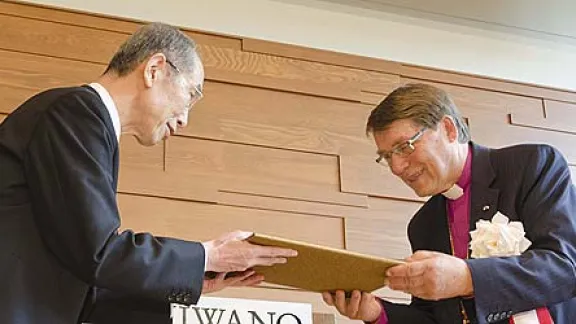
Bishop Emeritus Dr Gunnar Stålsett (right) receives the 30th Niwano Peace Prize from Rev. Nichiko Niwano, Honorary President of the Niwano Peace Foundation, in Tokyo, Japan. © Niwano Peace Foundation
LWF Lauds Norwegian Bishop Emeritus Stålsett for Niwano Peace Prize
The Lutheran World Federation (LWF) has lauded the “extraordinary ministry and witness” of Bishop Emeritus of Oslo Dr Gunnar Stålsett, as he received the Niwano Peace Prize in Tokyo today, 16 May.
“Throughout your ministry, you have looked for opportunities to witness at the intersection of church and society,” said LWF General Secretary Rev. Martin Junge in a congratulatory letter to Stålsett, underlining his commitment to the pastoral and ecumenical ministry, leadership in the LWF and Church of Norway, and work in the public sphere.
“By bringing these two dimensions so meaningfully together you have given powerful witness to the centrality of ‘incarnation’ in Lutheran theology. In our theological tradition God’s call to mission is always understood as God’s call into the world,” Junge said.
“It is at the heart of issues of justice, peace and reconciliation in our struggling and wounded world that the newness of the Gospel of Jesus Christ speaks and is received for the sake of transformation,” he added.
Stålsett, 78, was awarded the 30th Niwano Peace Prize in recognition of the Lutheran leader’s “extraordinary and persistent work for peace,” the Niwano Peace Prize Committee said. The committee noted that he “combines a deep spirituality and passion for social justice and for human rights with a determination to engage with leaders from politics, religion, civil society and business.”
The prize was established in honor of Nikkyo Niwano, the first president of the lay Buddhist organization Rissho Kosei-kai, to recognize and encourage individuals and organizations that have contributed significantly to inter-religious cooperation and the cause of world peace. It was first awarded in 1983 to Brazilian Roman Catholic Archbishop Hélder P. Câmara.
Junge said Stålsett, LWF general secretary from 1985 to 1994, gave critical leadership in the worldwide Lutheran communion in its support for the liberation struggles of Namibia and South Africa, and in starting the Guatemala peace process.
“I can testify that your legacy lives on. Here I think particularly of the commitment to ecumenical engagement and to interfaith relationships and understanding, of the principle that we Lutherans should look for opportunities to be engaged in efforts toward reconciliation,” Junge said.
Tolerance and Respect
In his acceptance message for the Niwano Peace Prize, Stålsett underlined the award’s recognition “that peace is about the integrity of creation and the harmony of humanity,” about the environment and development, and human dignity and justice.
Referring to a pilgrimage to Hiroshima, and the memory of the atomic bombings on Japan in the Second World War, Stålsett said people of faith and all those “who revere the sanctity of life, should not rest until the world has agreed on a binding convention against the possession and use of nuclear weapons.”
On armed conflicts in many world regions today, Stålsett noted that extremism threatens peace and ethnic harmony, and religion was being abused to foment war instead of building peace. He underlined “tolerance and respect as one of the most urgent tests for religious leaders of today.”
Stålsett was Bishop of Oslo in the Church of Norway from 1998-2005, and had served in the 1970s as General Secretary of the church’s council on Ecumenical and International Relations. He has served on the executive committee of the World Conference of Religions for Peace and was moderator of the European Council of Religious Leaders.
He served in Norway’s parliament and government, and in various international commissions, including the Advisory Council for Arms Control and Disarmament. From 2006 to 2010 he was the special envoy to the peace and reconciliation process in East Timor (Timor Leste). He has served three times on the Norwegian Nobel Committee.


